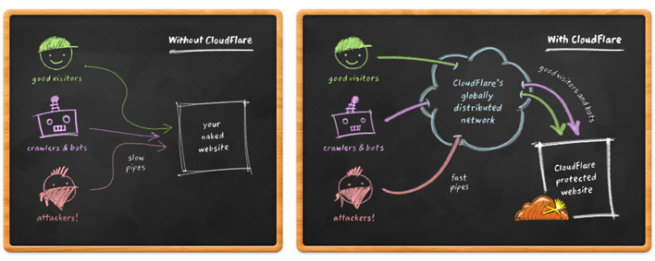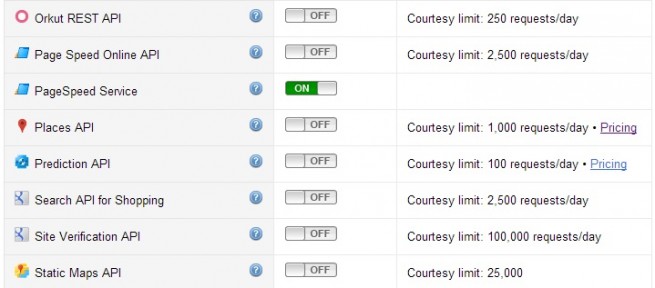A while ago I wrote this post on how to speed up your WordPress website. Since then, I’ve tried two more speed tricks which improve user experience and SEO. One is called Cloudflare, the other PageSpeed Service by Google.
I was pleasantly surprised by both. Reasons being they are free, offer extra security measures and indeed speed up websites. Let me show you what they are and how they do it.
Cloudflare
Give us five minutes and we’ll supercharge your website.
Cloudflare is a free CDN (content delivery network) which acts as a proxy between your visitors and the server your website is hosted on. I saw an increase in speed by an average of 5-10% using the free plan, had an average of 5 minutes of downtime weekly and a lot of malicious and spam attacks rejected.

Setting it up isn’t that straight forward, because you have to rename your DNSs via your host’s admin panel, but it’s not anything too difficult. Namecheap, the hosting we’re currently using, has a one-click setup button, which made it so much easier for us to configure.
The advantages of Cloudflare:
- Lowered load on your server – CPU and data usage of your account get lower, because it serves cached content
- Improved speed – Cloudflare has servers all around the world and the one closest to your visitors is always being used
- Bot and threat protection – Third party apps in cooperation with Cloudflare are being used to scan and identify malicious threats online and stop the attacks before they even get to your site
- Cloudflare apps – You can enable extended functionality by using 3rd party modules
- Comment spam protection – Third party resources reduce the number of spam comments
- Offline browsing mode – If something happens to your server, Cloudflare should still be able to serve cached version of your website
- Site Stats – You get crawl statistics for both humans and search engines
Cloudflare has a paid service, too. Paid plans give you more security, apps, faster servers and customer support.
Switching over to Google’s PageSpeed Service. What is it and why haven’t we heard about it yet?
PageSpeed Service
Turbocharge your web site with Google’s PageSpeed Service.
It’s still in beta. You need to sign in with your Google account and you’ll be presented with a Google Console, where you control every API including Page Speed Service. To compare your website speed with and without their service you can check this Comparison Test Tool by Google.

PageSpeed Service uses data from PageSpeed Insights to optimize your website. If you haven’t already, you can download Insights for Chrome and Firefox.
PageSpeed Service benefits:
- Dynamically rewrites webpages – applies performance best practices
- Serves optimized content via Google servers – reduces load on your servers
- Reduced perceived page load time – prioritizing portions of content which get served first, so you visitors have better user exeprience browsing your website
- Security – your website gets security of Google servers
- Parallel fetch – fewer requests and lower round-trip times
- Made by Google – works well, good support and expect lots of improvement updates
Setting up Google PageSpeed Service is pretty much the same as configuring CloudFlare. There are some DNSs to be renamed and it’s all easily done through the 3-step process.
The problem I find with the service is, while it’s easy to set up, it’s – limited free trial. There’s no rumor on how long this free trial blessing from Google will last.
The complete list of PageSpeed Service FAQs can be found here.
We tried both “turbocharge” and “supercharge” services running simultaneously on our WordPress blog and we didn’t experience any issues, but there were not big speed improvements either. I might try using one of the paid CDN solutions out there. Maybe Pingdom score gets even higher. I found it much reliable and more consistent than any other page speed tool, including Google’s Speed Comparison Tool.
Both services might have issues with image search. Because images are being served from another location and if you have a lot of them, your traffic from image search might drop, but the most recent rumor is that the problem has been fixed. Don’t forget to check other ways of speeding up WordPress following performance best practices and using .htaccess.
Have you had any experience with PageSpeed Service or CloudFlare on your WordPress website? If so, tell us your thoughts. Which one’s faster, better or more reliable for you?
note: While free services have their advantages, some of the drawbacks would be inconsistency and mediocre customer support. We suggest CloudFlare and currently use one of their plans.
Update: PageSpeed Service is no longer in use since August 3rd, 2015.

Hey there Dragan, thanks for the (mt) Media Temple mention! If you ever need anything from us, we’re here 24/7 via phone, chat and Twitter. We also have a great WordPress evangelist available on Twitter: @mt_suzette. :)
Drew J
MediaTemple.net
@MediaTemple
Drew,
Thanks for stopping by. We’ve recently switched to Media Temple and we’re pretty happy with your service.
Hi! I’ve tested speedup on my site (works with WordPress) and it works great… I’m at DreamHost. After reading your article, I have signed with CloudFlare and (nearly) activated its free service.
Before activating it I read the article about CloudFare and AdSense issues and decided not to go ahead because I have AdSense and don’t want it to be missed…
Thanks for the article!
Lucas,
What is “speedup”?
CloudFlare works really good and I hope the issue with AdSense gets fixed soon.
So sorry, I mixed the words :) I meant PageSpeed.
I have PageSpeed Service running on this website and I’ve deactivated CloudFlare.
To me it seems CloudFlare works faster for European visitors and overall, but when I choose US as a testing location, then PageSpeed works better.
Anyways, I’m glad you got one of them to work.
Nice Article. I’ve never had much luck out of free CDN, there are just too many costs associated with it to do it well for “free” for many people :-)
I guess if you look at it 5 minutes downtime a week isn’t bad. Really just depends on your needs.
Blake
Blake,
Thanks for stopping by.
I saw no downside in testing free CDNs, well, apart from the time it takes to set them up. If you find some, test either of these two, you’ll be surprised.
By the way, I hear you when you say “… too many costs associated with it to do it well for free…”. CloudFlare tries to sell you their support and 3rd party apps (modules) and Google, we all know how they use gathered website information.
Thanks, Dragan, for the great article. I haven’t used a CDN before, so I’m looking for reviews about CloudFlare. I’m interested in it not only for the speed but also for the security. Do you have any thoughts on CloudFlare’s security?
Thanks. I haven’t had the need for their security services, since we use Wordfence security plugin on this website, but I know CloudFlare’s security is “on” by default and you don’t have to configure a whole lot of things. It filters out all known malicious IPs.
Thanks, Dragan, for the great article and other information on security.
You bet :)
I’ve been using CloudFlare for awhile now. I have not had any issues with Adsense so far as I can tell. I do not use the Google offer though. I figure the less I run the better for my own site :) Great review of a fantastic free service.
Jason, so sorry for the late reply; just saw it. it seems that CloudFlare fixed the issue with AdSense several months ago, so that’s good news.
I agree with your logic, the less things you run the better for your website. We now also run only CloudFlare and it works great.
Thanks so much for stopping by.
Awesome article here brother. But I have a doubt . Will cloud fare always remain free or will they too charge in due course of time ?
To be honest, I have no idea. I know their paid plans differ a lot from the free ones, but maybe you could ask them.
… and please reply here if you get the answer, I too would like to know.
I think the issues between cloudflare and adsense got resolved… also, that link is broken.
Thanks Andrew, for both. Will update the article and fix the link.
Does CloudFlare impact Google AdSense?
The basic CloudFlare setup will not impact Google AdSense at all. CloudFlare does have a beta feature called Rocket Loader™ that may break Javascript on some sites, so you should turn Rocket Loader off if you see an issue with the JavaScript or a dramatic change in AdSense numbers.
Please follow the link – https://support.cloudflare.com/entries/22051853-Does-CloudFlare-impact-Google-AdSense-
Thanks so much for clarifying that, Avdhesh and for the link.
AdSense works well with CloudFlare and Rocket Loader, you just turn off the Rocket Loader only for AdSense, and leave other by default. To do this, place
before
on every AdSense code you have.
I hope this will help you. :)
Thanks for the tip, Nadiar.
Hi, Do I get any Free Version of CDN plugin for WordPress?
CDN is not a plugin, but an online Content Delivery Network service. You have to sign up for it.
I believe the problem with Adsense has to do with Rocket Loader.
I had the same issue 2-3 years ago but since de-activaed Rocket Loader.
I have had no problems since but after failing withn MaxCDN I am allways searching better than Cloudflare.
I still find the Cloudflare plugin slows page speed with Pingdom test.
You’re right, Rocket Loader showed some compatibility issues with AdSense, so deactivating it should fix those. Tell us if you find the optimum performance solution in the near future.
I wrote an article on how to speed up your website with CloudFlare and mix that together with W3 Total Cache plugin it really rocks (http://spazlport.com/tech/w3-total-cache-settings-2013-shared-hosting-best-performance/) I like your method really too, however if you defer parsing java-script so it loads later with the caching plugin it works better that way than using cloudflares minify or rocket loader. I would use rocket loader for other scripts than WordPress.
Thanks Spazy. I’ll try your method.
I’ve used CloudFlare’s free plan and got really impressed by it. I’m considering moving to the PRO service soon :)
Yes, I was impressed by their service, too.
Like others, almost one week ago, I configured my blog on CloudFlare (free) and it’s working perfectly. Google Pagespeed Insights shows a good score and other tools also like Pingdom and Webpagetest. So far I am happy and there has been no issues! And thank for your nice balance comparison of both services :)
Glad you got it to work. Cheers
Yes, Hi, Do I get any Free Version of CDN plugin for WordPress?
CDN is a Content Delivery Network, not a plugin. CloudFlare is a free CDN you can setup with any website you use. I believe W3 Total Cache plugin for WordPress has several options for configuring CloudFlare, but nothing which you cannot already do from within CloudFlare’s dashboard.
I am currently using Cloudflare, and planning to move to PageSpeed, but problem is PageSpeed does not support bare domains.
That’s why I am hesitating a bit.
It will work with non-www domains, too.
How?
Google says they don’t support site with naked domain.
Can you give me the link where it says they don’t support it? Thanks.
Yeah, it looks great until you read the terms of service.
“CloudFlare reserves the right to investigate you, your business, and/or your owners, officers, directors, managers, and other principals, your sites, and the materials comprising the sites at any time. These investigations will be conducted solely for CloudFlare’s benefit, and not for your benefit or that of any third party.”
Plus they talk about the right to add ads, and do just about anything they please to your website. While they keep the sole remaining right to shut off the service at any time without notice.
Thanks, but no thanks.
Tom,
Thanks for bringing this up. I haven’t read their TOS (which is rather interesting, now that copy/pasted the interesting parts), but I found this article http://halfelf.org/2013/i-dont-understand-cloudflare/ which reminds me to avoid free online services.
For everyone else who might want to try CloudFlare I suggest you ask them about the things that worry you, before signing up.
Hi Dragan,
Can I use both cloudflare and Google PageSpeed together?
Hi Suanlian,
I believe Google PageSpeed discontinued their service.
It certainly has been a long time since this was posted! I found this article because I was looking for PageSpeed… INSIGHTS and CloudFlare not working with it. Still, as a good geek that I am, hehehe, I never really knew about Google’s PageSpeed so THANKS for letting me learn about an obsolete, but cool-to-know-about technology of the past. ;)
Hey Emilio, thanks for the comment. I believe Google PageSpeed Service discontinued a long time ago, but Cloudflare is still going strong.
Hey there! Yes, that’s correct. CloudFlare is actually working really well for me. The only thing that I can’t understand is why PageSpeed Insights isn’t working for me anymore—but I think that’s out of the scope for this post.
Hey Emilio, I’ve just checked your website using PageSpeed Insights and it works just fine.
Check out the results here .
Hi Dragan,
Thank you so much for sharing this blog with us, I’m also troubling with my website speed for the last 4-5 months and someone advised me to use Cloudflare and Yes, you’re right it will help me a lot and now I’m got the speed 90+ on google page speed.
I am using Cloudflare’s free CDN and I love its performance. However, from the past few months, my site was loading too slow and I was worried. After researching a lot on the internet, the culprit was the website’s theme. And this article that you wrote is definitely going to help me more!
An amazing article by one of the amazing article writer in the world. I really love reading your blog its kinda great and it motivates me to live my life without worrying about others! Thank You so much you’re my true hero!
Thanks for the blog but If your looking to switch your career to the Airline Industry we the Fusion is the best place to pursue. It is one of the best Air Hostess Course